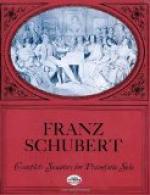Kuhnau was not the originator of programme-music. In the so-called Queen Elizabeth Virginal Book,[46] in the Fitzwilliam Library, there is a Fantasia by John Munday, who died 1630, in which there is given a description of weather both fair and foul. Again, Froberger, who died in 1667, is said to have been able, on the clavier, to describe incidents, ideas, and feelings; there is, indeed, in existence a battle-piece of his. And then Buxtehude (d. 1707) wrote a set of seven Suites for clavier, in which he is said to have represented the nature and characteristics of the planets; these are, unfortunately, lost. With Froberger’s music, at any rate, Kuhnau was familiar. In a long preface to these Bible stories, the composer refers to the subject of programme-music. He reminds us how from ancient times musicians have tried to rival the masters of rhetoric, sculpture, and painting in terms of their own art. And he expressly refers to programme pieces, and even to sonatas by the “distinguished Froberger[47] and other excellent composers.” The essence of his long, elaborate, and, at times, somewhat confused argument (it must be remembered that he was discussing a very difficult subject; and, also, that he was the first to write about it) is as follows:—He believes music capable by itself of producing wonderful effects, but in special cases, requiring the assistance of words. Music, he tells us, can express sadness or joy; for that no words are necessary. When, however, some individual—as in his sonatas—is referred to, words become essential, i.e. if one is to distinguish between the lamentation of a sad Hezekiah, a weeping Peter, or a mourning Jeremiah. In other language, words are necessary to render the emotion definite. Kuhnau gives a quaint illustration of the absolute necessity of words in certain cases; and that illustration is of particular interest, inasmuch as it points to still earlier, and possibly, clavier sonatas. “I remember,” says our author, “hearing a few years ago a sonata composed by a celebrated Chur-Fuerst capellmeister, to which he had given the title, ‘La Medica.’ After—so far as I can recall—describing the whines of the patient and of his relations, the running of the latter to the doctor, the pouring forth of their sorrow, there came, finally, a Gigue, under which stood the words, ’The patient is progressing favourably, but has not quite recovered his health.’ At this some mocked, and were of opinion that, had it been in his power, the author might well have depicted the joy at a perfect recovery. So far, however, as I could judge, there was good reason for adding words to the music. The sonata commenced in D minor; in the Gigue there was constant modulation towards G minor. At the final close, in D, the ear was not satisfied, and expected the closing cadence in G.” In this wise was the partial recovery expressed in tones, and explained in words.




